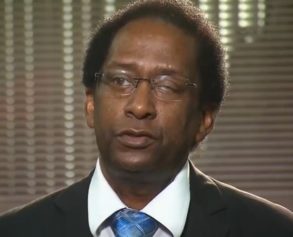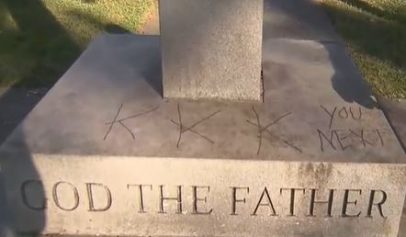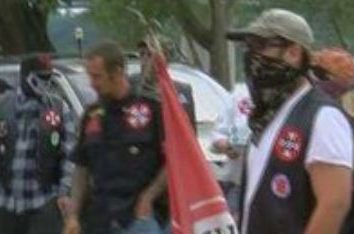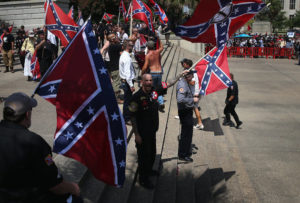
COLUMBIA, SC – JULY 18: A Ku Klux Klan member shouts racial slurs to African Americans at a Klan demonstration at the state house building on July 18, 2015 in Columbia, South Carolina. The KKK protested the removal of the Confederate flag from the state house grounds, as law enforcement tried to prevent violence between the opposing groups. (Photo by John Moore/Getty Images)
On Saturday, the Ku Klux Klan, supported by neo-Nazi and Christian fundamentalist groups, held a rally in Columbia, S.C. to protest the removal of the Confederate flag on the statehouse grounds. If there was any question as to whether the Confederate flag represents domestic terrorism and white supremacy, all doubts have been put to rest.
Fifty Klan members and supporters gathered on the steps of the state Capitol. As NPR reported, the protesters were waving Confederate battle flags, and at least one held a flag bearing a Nazi swastika. Hundreds of jeering counter protesters were on hand, including anti-racism and Black Nationalist activists who called out the names of Black people who were killed by police, and told the KKK to go home. Dozens of law enforcement officers used metal barricades to separate the crowds from the Klan.
The pro-Confederate flag rally was organized by the North Carolina-based Loyal White Knights of the Ku Klux Klan, believed to be among the largest KKK chapters or factions. Black Educators for Justice, based in Jacksonville, Fla., also held a rally on the north side of the Statehouse, where the Confederate flag was removed earlier this month, as the Associated Press reported. According to the S.C. Department of Public Safety, the crowd was estimated at approximately 2,000. Five people were arrested, and up to 23 were treated for heat exposure.
The kkk has arrived. pic.twitter.com/IA81fDV71D
— Paul Zoeller (@pzoeller) July 18, 2015
White supremacist rally in SC pic.twitter.com/1UIWEQSWaY — Jim Ryan (@jimryantx) July 18, 2015
not an uncommon example of humanity in SC: Leroy Smith helps white supremacist to shelter & water as heat bears down. pic.twitter.com/GoF23r3mRe — Rob Godfrey (@RobGodfrey) July 18, 2015
At Least Five Arrested as KKK, Black Panther Group Clash in South Carolina http://t.co/8R2W3kdtuV #UniteBlue pic.twitter.com/44ledAiGVK
— The Progressive Mind (@Libertea2012) July 19, 2015
#KKK protest in South Carolina capitol goes about as well as expected, 5 arrests http://t.co/9I1tvmqBJc pic.twitter.com/QwP359MY22
— Occupy Wall Street (@OccupyWallStNYC) July 19, 2015
“They took our flag, so be it,” said William Bader, an imperial wizard of the Trinity White Knights, based in Kentucky, or “Klantucky” as he described it to the Guardian. “They’re taking our heritage from us. They’re taking the freedom out of America.”
Steven Johnson, a South Carolina father of two, was waving a Nazi flag at the event.
“The Blacks have been out here attacking people, stealing people’s property, taking their flags,” he said. “I’m scared of what my family’s about to grow up with.”
James Evans Muhammad of Black Educators for Justice had a few choice words for Klan attendees, however.
“What you call a battle flag is the result of Black people suffering through slavery, through rapes and murders and robbing,” he said. “And many of you have children in your family as a result of those rapes.”
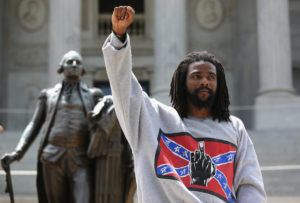
COLUMBIA, SC – JULY 18: A man holds a black power salute during a Black Educators for Justice rally at the South Carolina state house on July 18, 2015 in Columbia, S.C. The White Knights of the Ku Klux Klan were scheduled to hold a rally there afterwards, and police presence was heavy to prevent altercations between the two camps. (Photo by John Moore/Getty Images)
“The KKK is like a gang,” said Malik Stroman, a Black activist who waved a Pan-African flag and wore a sweater bearing a Confederate flag with a Black middle finger on top of it. “Now, if we said a whole lot of bloods were going to have a rally, all of them would be locked up. But the KKK can come up here and get protected.”
Mark Potok of the Southern Poverty Law Center told the Guardian that “The Klan today is weak, small and poorly led,” with no political influence and a membership of fewer than 4,000, down from its peak of 4 million in its heyday in the 1920s, and 40,000 during the 1960s Civil Rights Movement. Meanwhile, Pippa Holloway, a historian at Middle Tennessee State University, told NPR that events such as the Confederate flag rally are used as a KKK recruiting tool, at a time when some whites feel white people are on the decline.
“Some people are frustrated with the way this country’s going. And white groups, white supremacist groups, are able to channel some of that frustration and resentment into membership, into numbers and into publicity,” she said.
The irony has not been lost on members of the Black community that for weeks—from the June 17 massacre at Emanuel AME Church in Charleston, up until the removal of the Confederate flag in Columbia earlier this month—whites defended the Confederate flag as a symbol of Southern heritage. Dylann Roof, a white supremacist and neo-Confederate sympathizer who killed nine Black churchgoers at Emanuel, was influenced by the Council of Conservative Citizens, a white nationalist hate group. Roof also had a Confederate flag license plate and was shown in photos waving the flag.
The flag is gone, at least as an official symbol in the Palmetto state, but racism is alive and well. And it was on full display at Columbia, in the state that was the first to secede from the Union in 1861. Each seceding state that followed invoked slavery and white supremacy as their reasons for leaving the U.S. The Confederate flag upheld those values, and returned during Jim Crow segregation as a symbol of Klan racial terrorism against Black people, the Southern Dixiecrats, and white resistance to civil rights following the U.S. Supreme Court school desegregation decision in Brown v. Board of Education.
“South Carolina has only been first in one thing: seceding from the United States,” John Holmes, a Black veteran and descendant of a lynching victim, told the Guardian. “They come in last in everything else – minimum wage, education, Medicare. The flag needed to come down first before they could address the other social issues.”
